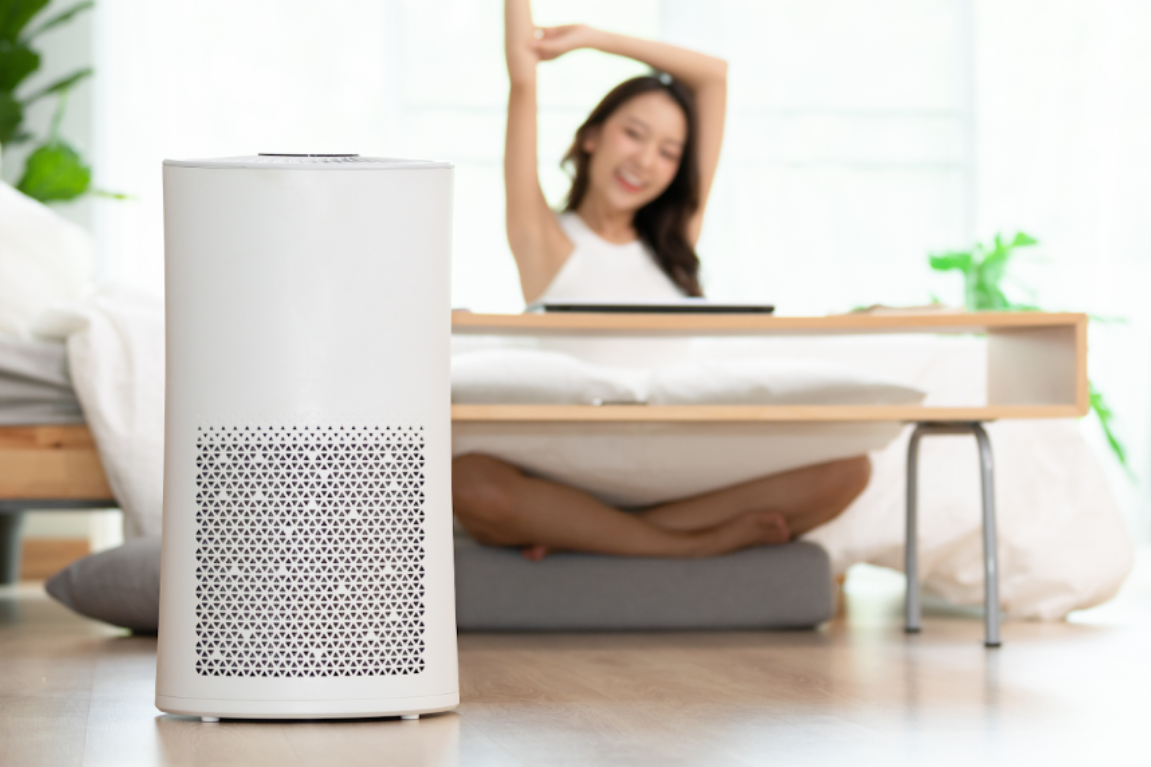Air purifiers have been rising in popularity as of late in response to rising concerns about air quality, and as we learn to live with a greater awareness of airborne viruses such as COVID-19. Air purifiers help to reduce the amount of dust and pollen in the air which assists with allergy management, asthma and any other respiratory issues. They also claim to remove impurities including odours, smoke, dust and pet dander.
However, you can be left with some questions, how effective are they? Will they seriously relieve spring allergies? Are they actually worth the money? Are air purifiers genuinely a reliable solution to get rid of indoor pollutants? Which type should I purchase? Let's delve into it all.
How they work
Let's strip it right back to the basics and dive into how air purifiers actually work. In essence, air purifiers function by cleaning the air, which may contain toxins, allergies, and pollutants. In contrast to humidifiers and essential oil diffusers, which add particles to indoor air. Something to highlight is the difference between air filters and air purifiers. Purifiers have the ability to filter and in addition cleanse the particles, whereas filters merely remove them. The three main ways they can do this are through filters, electrical attraction, or ozone.
Filters
Air purifiers that use the filtration method have an internal fan that sucks air in, and then using its internal filter, filters the air by pulling any unwanted particles from it and then sanitises it. The room is then recirculated with clean air. To get a smidge more technical, air purifiers employ very fine sieves in their filters that filter minuscule particles from the air that cannot be seen by the human eye. The finer the sieve inside the air purifier, the finer the particle it will remove. These tiny particles, such as smoke, mould spores, pollen, bacteria, viruses, and pet dander, are invisible to the human eye.
HEPA filters
High-Efficiency Particulate Air (HEPA) filters are the benchmark when it comes to air purifier filters. These filters are certain to collect 99.97% of airborne particles larger than 0.3 microns, (the standard unit for determining the size of airborne particles is the micron.) Smaller allergens like dust, smoke, chemicals, asbestos, pollen, and pet dander are effectively removed by HEPA filters. Room air conditioner filters are not as effective in purifying the air as air purifier filters because they can only capture particles that are 10.0 microns or larger.
The amount of air that is passed through a HEPA filter will determine how clean the air is. Whether a HEPA air purifier can meet your air purification needs will depend on the air cleaner's room capacity. Top-tier manufacturers produce air purifiers with an average of 6.8kgs of activated carbon/zeolite blends, which absorb pollutants and odours and deliver 6 air exchanges per hour in a typical room.
Changing the HEPA filter of your air purifier, or replacing it entirely, is a task that needs to be done regularly. A variety of factors affect how long your HEPA filter lasts including:
- hours used
- The Speed used
- Outdoor air pollution levels
- Indoor air pollution sources (such as cooking)
- If the pre-filter is frequently vacuumed or not
Electrostatic precipitating cleansers
Electronic air purifiers, or electrostatic precipitating cleaners, suck in particles with a fan and charge them with a network of high-voltage cables. Multiple plates have the opposite electrical charge, which draws impurities to them as they move by the plates. Making this the ideal option for those who don’t want to bother with pricey HEPA filter refills. However, keep in mind that electronic air purifiers are not as effective as HEPA filters, they remove 95% of contaminants while HEPA air purifiers remove 99.97% of particles.
Electric filters
Synthetic fibres that generate static charges are used in electret filters in air purifiers to attract particulates. There are several different varieties of electret filters, including plain, pleated, disposable, and reusable. How frequently you should replace the filter depends depend on the kind you need.
Electrical attraction
Another type of technology that air purifiers use to capture particles is electrical attraction. Electrostatic precipitating cleansers, electret filters, and negative ion generators are the three categories of air purifiers that use electrical attraction as their primary mode of operation. A negative ion generator may occasionally serve as the air purifier's only cleaning component or it may cooperate with a HEPA filter.
Negative ion generators
Negative ion generators produce gas molecules with negative charges, or ions, which stick to the airborne particles and gather in the filter. However, a lot of ions return to the air and adhere to your home's furniture and other surfaces, staining them.
Ozone
Ozone air purifiers purposefully produce the gas ozone. By altering the chemical makeup of airborne particles or other gases, ozone can cover up scents while also giving the impression that the air is cleaner and fresher. Ozone makers, however, do not actually filter out the tiny particles that cause asthma. Keep in mind that ozone can be hazardous to your health.
Ozone is naturally produced by lightning when it slashes through airborne oxygen molecules. Ozone is a potent lung irritant on the ground however helps shield humans from damaging UV radiation in the skies. Ozone can aggravate allergies and asthma when it is produced artificially, harming the lining of your nasal passages and lungs, resulting in coughing, throat discomfort, chest pain, and shortness of breath.
So are they effective?
The simple answer is yes, but an air purifier probably won't get rid of or neutralise all the irritants in your house. This is because numerous particles can accumulate on both hard surfaces like your walls and soft surfaces like furniture, bedding, and carpeting.
To minimise air particles:
- Regularly clean rugs, carpets, and upholstery
- Use a HEPA filter vacuum at least once a week
- In the event of severe allergies, instal vinyl or hardwood floors instead of carpets.
- Once a week, wash bedding in hot water
- Pets should receive frequent baths. Try to avoid sleeping with your pets if you have an allergy to animal dander
- Check that the humidity level in your home is appropriate and low enough to prevent mould and dust mites
- If you have to use harsher chemicals, open a window and turn on fans to ventilate your house
How to get the most out of your air purifier:
- Stay on top of filter replacing, ensure you note down the date you first used the purifier and replace the filter after the specified number of months.
- Keep rooms well-sealed, Filling up gaps around windows and doors using insulating tape is the simplest approach to improve the seal of your home.
- Place air purifiers at least 10cm away from the wall
Which air purifier should I get for my business?
RENSAIR is a hospital-grade HEPA air purifier that is boasting all the right features when it comes to air purification. This purifier uses a HEPA air filter and a UVC lamp to kill any airborne viruses that are trapped by the filter. A seriously impressive feature of this air purifier is that it comes with a built-in indicator to let you know when both the HEPA filter and UVC lamp require changing.
Where it is used:
- Schools
- Hospitals
- Accommodation
- Hospitality venues
- Offices
A test of this air purifier was conducted at the Danish Institute of Technology. Bacteria was intentionally released into a room with the air purifier running. After 15 minutes 0.0011% of the bacteria was detected in the laboratory control room. After half an hour of the air purifier running, the bacteria was completely undetectable. Without the air purifier running, after 15 minutes there were still 61.9% of bacteria present and after 30 minutes of natural decay, there was still 20.5% present.
Features:
- This patented HEPA Filter and UVC Lamp innovation design traps and destroys 99.97% of airborne bacteria and viruses
- Hospital Grade HEPA H13 Filtration
- 9,000 hours continuous use before filter change
- Unique 18W UVC Lamp
- Purifies 560m3 of air per hour
- dBA noise levels - Quiet operation from 45dBA
- Independently Laboratory Tested
- Easy to use, plug in, set and go
Attributes:
- Hospital grade technology
- Laboratory trialled and tested
- Large cleaning capacity
- Effective air circulation
- Safe maintenance
Cleanpro can save you the trouble and install this HEPA air purifier for your business. Firstly they will provide you with a client audit and discuss your hygiene needs, arrange for an on-site survey and make recommendations followed by expert installation and maintenance, should this be required.
The bottom line
Research has proven air filtration by air purifiers can aid in the removal of dangerous indoor particles, particularly allergies, smoke, and mould. However, the most effective use of air purifiers is in combination with appropriate filtration and cleaning methods. Although it won't be enough to improve indoor air quality, an air purifier can undoubtedly be helpful. Always consult your doctor first about strategies to control your symptoms if you suffer from any underlying health conditions, such as allergies or asthma.















